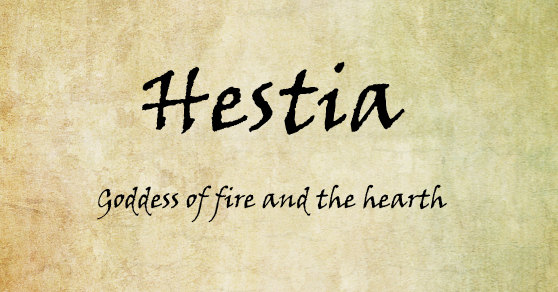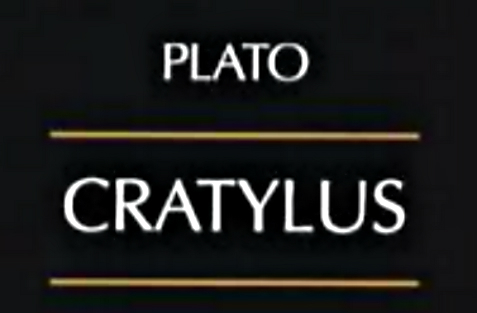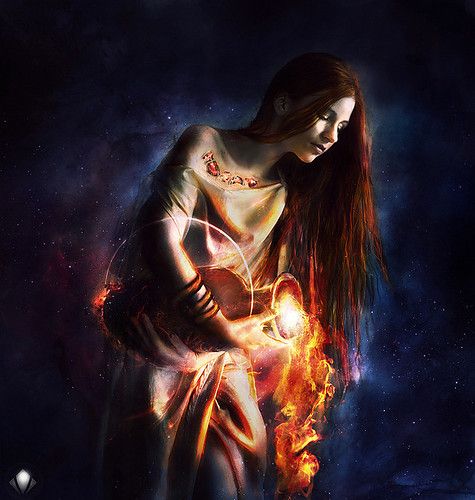It looks like you're using an Ad Blocker.
Please white-list or disable AboveTopSecret.com in your ad-blocking tool.
Thank you.
Some features of ATS will be disabled while you continue to use an ad-blocker.
12
share:

The Forgotten Goddess Hestia
The Goddess of Fire, the goddess that just "is"
One of the original six Olympians, she is the first as well as the last to be born. Not much is known about her, not many stories or mentions of her in ancient works. A few blurbs from Plato, Apollodorous, Hesiod, Ovid, and the anonymous authors of the Homeric Hymns is where most of her biography/history is built from. And because so much is left unknown about her, this goddess, for all intents and purposes..just "is". Which, quite ironically, is what her name is translated to from Greek to English.
I am not going to write much about the traditional beliefs that are associated with this goddess.(I'll post a links below) For me, this is going to be an explorations of my thoughts and ideas about who she was..purely speculation, with a hint of possibility, and maybe some anecdotal evidence presented as well.
The purpose? It is quite simple really... She truly is a beautiful representation of "the self". One that deserves some deeper thought then a hearth, and I wish to try to present a different view of what she could be. To create some alternative thought and possibly, look at things from a unusual or less explored perspective.
Hestia's symbols: The lantern and The hearth (please note it is actually the flame/fire within the hearth that is representative of her, not the hearth itself.) and architecture
Sacred animal: The Ass or the calf
Flower: unknown (but I'm assigning the Fire Lilly to her)
Origin: First and last born of Cronos and Rhea. The Titan Gods
Temple: She was worshiped at all hearths everywhere, so, no temple needed.
Many believe Hestia to be the goddess of the hearth. The one who is the center of all daily activities and family. In the ancient times, people would make their daily sacrifices to Hestia first, before all other gods/goddesses, which is already a clue to how important she was. They would build a hearth in the center of the town that was always kept lit. Marriages from those days would involve the bride and groom to light a candle and keep it lit throughout the ceremony, as well as use it to light their hearth when they entered into their new home. Babies were blessed at the hearth.. every home would be built from the center out, built around the hearth. The hearth and by association, Hestia as well ,was the center of all activities.
So, Hestia was thought of as the goddess of family, home, and hearth. But..if you would take a bit of a journey with me..I believe that there could be a more beautiful meaning to this goddess. One that has been overlooked by even the ancients..a deeper, more profound reason as to why she was who she was...

Let's take a look at one of Plato's works, the Cratylus . Within that work, he talks a bit about Hestia and her name origins..
Soc. Shall we begin, then, with Hestia, according to custom?
Her. Yes, that will be very proper.
Soc. What may we suppose him to have meant who gave the name Hestia?
Her. That is another and certainly a most difficult question.
Soc. My dear Hermogenes, the first imposers of names must surely have been considerable persons; they were philosophers, and had a good deal to say.
Her. Well, and what of them?
Soc. They are the men to whom I should attribute the imposition of names. Even in foreign names, if you analyze them, a meaning is still discernible. For example, that which we term ousia is by some called esia, and by others again osia. Now that the essence of things should be called estia, which is akin to the first of these (esia = estia), is rational enough. And there is reason in the Athenians calling that estia which participates in ousia. For in ancient times we too seem to have said esia for ousia, and this you may note to have been the idea of those who appointed that sacrifices should be first offered to estia, which was natural enough if they meant that estia was the essence of things. Those again who read osia seem to have inclined to the opinion of Heracleitus, that all things flow and nothing stands; with them the pushing principle (othoun) is the cause and ruling power of all things, and is therefore rightly called osia. more
esia = act, state of
ousia = true being, essence, substance
estia = hestia with the h dropped means "is"
Within Plato's words lies a hint as to what this goddess was possibly meant to represent. The act of being true, the essence of oneself, having substance... She "is" the center of all things self. She was the fire or hearth of mount Olympus, the home of the Gods. The sanctuary and soul of the place, keeping things in order for the other Gods who would always return from their travels to find sustenance, comfort, and balance.
Continued...
edit on 24-8-2016 by blend57 because: (no reason given)

One of her symbols was the hearth. The hearth could be thought of as the internal or sacred flame, because she was not the hearth itself, but the flame glowing within. The place where you come back to in order to center yourself, in order to find peace. To keep the eternal flame alive would be to keep true to your inner self. To never let the fires of your heart and soul burn to embers...to always have substance.. and remain true to the very essence of who you are.
The other symbol Hestia is associated with is the lantern. As you can see by the description below, the lantern was historically used as a symbol meaning "the light of the world" and also is a symbol for hope. She was the light that guided you on your path...and also, that kept hope burning within your heart.
The word "Fanous" (Fanos, Phanos and Fanoos in Egyptian dialects) is a term of Greek origin transliterated to "candle". It means 'light' or 'lantern'. It was historically used in its meaning of "the light of the world," and is a symbol of hope, as in "light in the darkness."
Combining these two symbols, it is possible that Hestia was never meant to be associated with the literal act of keeping the flames lit within your homes. Or, that she had a dual purpose/meaning. The sacred fire was very important to the Greeks and was very hard to keep burning, so, keeping the hearth lit within your home was pivotal for their everyday life. One reference to this:
The fire of Hestia was always kept burning, and, if by any accident it became extinct, only sacred fire produced by friction, or by burning glasses drawing fire from the sun, might be used to rekindle it
So, maybe she served two purposes.. to make sure that all hearths were kept burning with the sacred fire,(by offering blessings to the goddess Hestia every day, morning and evening, you were also checking upon the fire and ensuring it still burned within the hearth.) The second part being to remember to check on the fire within, your personal self and being. Both needing you to take pause in your daily lives and reflect. (Daily blessing to Hestia)
The Connection of architecture to this goddess may be in association with the hearth and the building of the homes centered around the hearth, the construction of oneself from the center outward, or building a strong foundation for your inner being, as well as continuing the construction throughout your family and generations after you. The hearth being your inner fire or the core of who you are that you want to build upon.
The other thought I had was that maybe, with all three attributed to her,(fire, hearth, architecture) that she could be associated with masons.. before the actual Masons came into existence. When masons was a title given to the builders of old..not the organization it is associated with now.
ma•son
ˈmās(ə)n/
noun
1. 1. a builder and worker in stone.
2. 2. a Freemason.
verb
3rd person present: masons
1. 1. build from or strengthen with stone.
The 3rd definition being the one I was referring to..Build and strengthen with stone. Which could then be attributed to the architecture of oneself and mind, body, spirit. To strengthen and build upon the core beliefs/values of who you are, continuously building upon those beliefs as you travel through life and strengthening them with the stones (added knowledge/beliefs) you lay around your hearth (personal being) as you go.

The quixotical philosophical writings of the scholars of that time seemed to drip dual meanings. And it was up to the readers of their works to interpret them the way they chose. This can be shown by how the goddess is represented in later years:
In later philosophy Hestia became the hearth of the universe, the personification of the earth as the centre of the universe, identified with Cybele and Demeter.
She was referenced as being the core or internal flame of the Earth. The center of everything, the one true connection to all that has been and all that will be. The fire that lights the inner depths and hearts of all mankind, as well as the flame that keeps hope burning and brings you renewed strength.
With all of that said, there is no proof that any of these musings are anymore than musings. Thoughts that stirred within my mind as I read through some of the factual data. Still, a lot of questions unanswered about Hestia... most of what I found was suppositions with a few references to the minimal writings left behind that mention her.
I know that there is always a logical interpretation to everything. A logical purpose that can be drawn about why she was represented the way she was. (keeping the fires lit, home/family association and the roles of all within the household) But yet, in my mind, there is also a spiritual/deeper meaning to what this Goddess offers..a more soulful/deeper purpose.
Continued..
edit on 24-8-2016 by blend57 because: (no reason given)

Final thoughts:
Is there a connection between Hestia and Gaia, as some/most of the information reads similar with regards to both Goddesses...are they really one in the same? Or a transference of ideals and characteristics from the Mother God to her child?
In Greek mythology, Gaia (/ˈɡeɪ.ə/ or /ˈɡaɪ.ə/ from Ancient Greek Γαῖα, a poetical form of Γῆ Gē, "land" or "earth"[1]) also spelled Gaea, is the personification of the Earth[2] and one of the Greek primordial deities. Gaia is the ancestral mother of all life: the primal Mother Earth goddess.
Vesta is the Roman equivalent to the Goddess Hestia, what other clues reside within their historical writings that would support this theory? en.wikipedia.org...(mythology)
Vesta is the goddess of the hearth at the centre of atrium and home. It was in the house and home that Vesta was most important because she was the goddess of the hearth and of fire. Vesta is particularly important to women of the household as the hearth was the place where food was prepared and next to it the meal was eaten with offerings being thrown into the fire to seek the future from the way it burned. The degree of the importance of Vesta and the hearth in Roman times carries on into modern English, where the word focus (Latin for hearth) continues to be used in a variety of ways, both scientifically and metaphorically, that although differing from the original meaning, still carry a sense of focussing or concentration on something of importance.
The prayers to Hestia seem to revolve around the blessings of abundance and wisdom and guidance, which could be recognized as both internal and external blessings of balance(duality) which is part of Hestia's repertoire.
For without you mortals hold no banquet, — where one
does not duly pour sweet wine in offering to Hestia both first
and last.
Come and dwell in this glorious house in friendship
together; for you two, well knowing the noble actions of men, aid
on their wisdom and their strength.”
Hestia, you who tend the holy house of the lord Apollo,
the Far-shooter at goodly Pytho, with soft oil dripping ever from
your locks, come now into this house, come, having one mind with
Zeus the all-wise — draw near, and withal bestow grace upon my
song.
All thoughts and speculation..none of it can be proven true beyond the beliefs and interpretations of my mind. But, for some reason, as I started to read through the collection of information on her, this is how I perceived her to be. This is where my thoughts lead me..and this is what I chose to present to you for postulation and reflection upon..
As always, this is just food for thought, take what you will from my mindless musings.. and add what you like. For even though I am trying to show a different perspective, I am always willing to view things from someone else's perspective as well.
Thanks for reading,
blend57
Everything dark or light holds no life until the flame of Hestia is bestowed upon it.
Links:
Hestia
Ancient Greece, Modern Psyche
Universe Reference
Wiki
Wiki Vesta
Mason def
Hestia
Hestia
Plato
Everything dark or light holds no life until the flame of Hestia is bestowed upon it.
Namaste
Namaste
Thank you for all the effort you put into this! it was extremely interesting, and I was mostly unaware of Hestia before I read this.
Keep up the good work and awesome content!
Keep up the good work and awesome content!
Being the goddess of the hearth, she must have had enormous importance. Thanks for sharing....the Greek Mysteries are among the most fascinating
manifestations of esoteric thought. They were a very creative people, and we (being their progeny) tend to understand the mindset a little easier
than the eastern Mysteries.
lucia2389
I also thought about the kundalini fire being associated with Hestia's flame since so many stories/beliefs seem to branch out/off of the original lore. And Gaia was a far reach as she is the mother of the Titans and therefore came before the birth of Hestia..But, I do not know if it was a transference of qualities to Hestia from Gaia... that is where my mine was going with that I think..Just like Vesta is Romes version of Hestia..the similarities are very close...
bigfatfurrytexan
She was more important than all others if you consider the amount of daily prayers given to her.. morning and evening prayers..as well as at every meal she was prayed to at the beginning and ending of them. Every birth, every marriage..she was truly an intricate part of daily living back then. But not a ton of information about her, so, she remains a bit of a mystery..
valiant
It was fun to go through all the "what if's" and "could be's" with regards to her meaning. Thanks for traveling that road with me and showing your support..
0racle
I'm glad you liked that saying at the end..I wrote that myself and I wasn't gonna put it in there, but a friend said I should, so I threw it at the bottom, part of the final thoughts..it just sounded right..ya know?
Thanks for the response and additional thoughts.
blend57
I also thought about the kundalini fire being associated with Hestia's flame since so many stories/beliefs seem to branch out/off of the original lore. And Gaia was a far reach as she is the mother of the Titans and therefore came before the birth of Hestia..But, I do not know if it was a transference of qualities to Hestia from Gaia... that is where my mine was going with that I think..Just like Vesta is Romes version of Hestia..the similarities are very close...
bigfatfurrytexan
She was more important than all others if you consider the amount of daily prayers given to her.. morning and evening prayers..as well as at every meal she was prayed to at the beginning and ending of them. Every birth, every marriage..she was truly an intricate part of daily living back then. But not a ton of information about her, so, she remains a bit of a mystery..
valiant
It was fun to go through all the "what if's" and "could be's" with regards to her meaning. Thanks for traveling that road with me and showing your support..
0racle
I'm glad you liked that saying at the end..I wrote that myself and I wasn't gonna put it in there, but a friend said I should, so I threw it at the bottom, part of the final thoughts..it just sounded right..ya know?
Thanks for the response and additional thoughts.
blend57
edit on 25-8-2016 by blend57 because: (no reason given)
new topics
-
Watts home paranormal activity
Paranormal Studies: 5 hours ago -
So, what is really going on in South Korea ?
World War Three: 6 hours ago -
Congress Says the FBI is Covering Up Vital Info on the Jan 5th 2021 D.C. Pipe Bombs at RNC-DNC.
Political Conspiracies: 6 hours ago -
The trial on kids was stopped
Medical Issues & Conspiracies: 9 hours ago -
Orbs Appear And Form Triangle On Live Cam.
Aliens and UFOs: 11 hours ago
top topics
-
Biden to award Presidential Citizens Medal to Liz Cheney and Bennie Thompson
US Political Madness: 14 hours ago, 11 flags -
Biden Has New Bizarre Injuries to His Face
Politicians & People: 12 hours ago, 11 flags -
The trial on kids was stopped
Medical Issues & Conspiracies: 9 hours ago, 9 flags -
Congress Says the FBI is Covering Up Vital Info on the Jan 5th 2021 D.C. Pipe Bombs at RNC-DNC.
Political Conspiracies: 6 hours ago, 9 flags -
Orbs Appear And Form Triangle On Live Cam.
Aliens and UFOs: 11 hours ago, 6 flags -
Elon Musk Calls for Tommy Robinson to be Freed - and Takes a Dig at Starmer
Politicians & People: 14 hours ago, 5 flags -
Something is not adding up in regards to the H-1B commotion
General Conspiracies: 13 hours ago, 5 flags -
So, what is really going on in South Korea ?
World War Three: 6 hours ago, 5 flags -
Watts home paranormal activity
Paranormal Studies: 5 hours ago, 3 flags
active topics
-
Congress Says the FBI is Covering Up Vital Info on the Jan 5th 2021 D.C. Pipe Bombs at RNC-DNC.
Political Conspiracies • 22 • : GotterDameron23 -
So, what is really going on in South Korea ?
World War Three • 7 • : MindBodySpiritComplex -
Post A Funny (T&C Friendly) Pic Part IV: The LOL awakens!
General Chit Chat • 7982 • : KrustyKrab -
Tesla Cybertruck Explodes in Front of Trump Hotel in Las Vegas
Mainstream News • 154 • : Guyfriday -
Ukraine halts transit of Russian gas to Europe after a prewar deal expired
Political Conspiracies • 115 • : Flyingclaydisk -
Biden Has New Bizarre Injuries to His Face
Politicians & People • 11 • : berbofthegreen -
The trial on kids was stopped
Medical Issues & Conspiracies • 11 • : annonentity -
-@TH3WH17ERABB17- -Q- ---TIME TO SHOW THE WORLD--- -Part- --44--
Dissecting Disinformation • 3906 • : duncanagain -
Biden to award Presidential Citizens Medal to Liz Cheney and Bennie Thompson
US Political Madness • 14 • : WeMustCare -
The C.D.C. Says There Was NO INFLUENZA Worth Reporting for the 2020-2021 Flu Season.
Diseases and Pandemics • 98 • : WeMustCare
12
